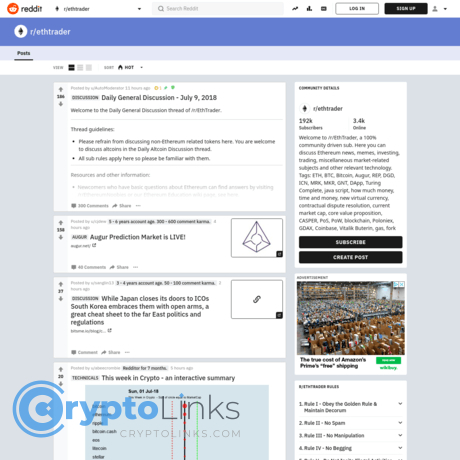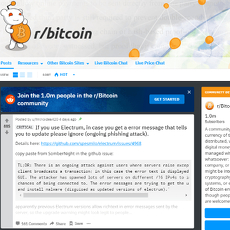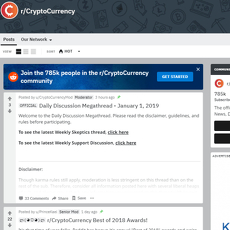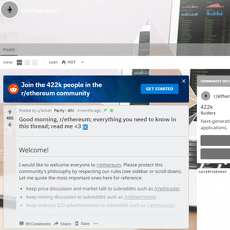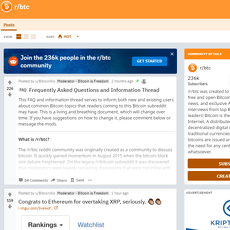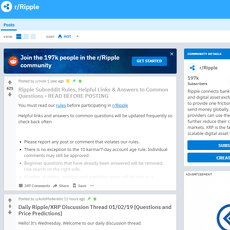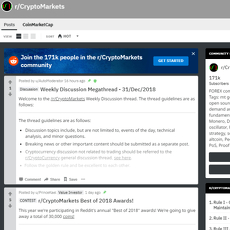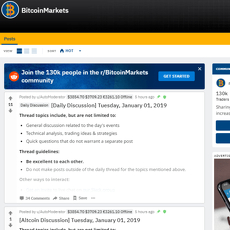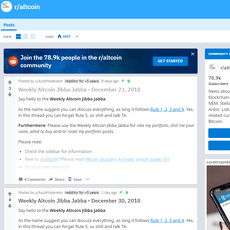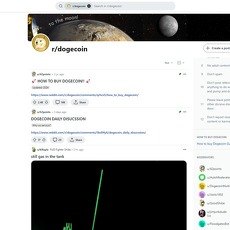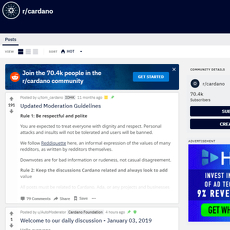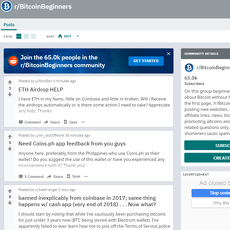r/ethtrader Review
r/ethtrader
www.reddit.com
r/ethtrader Review Guide: How to Use Reddit’s Biggest ETH Trading Community + FAQ
Ever open r/ethtrader and wonder, “Is this alpha or just noise?”
If you want to use Reddit’s busiest ETH trading community without getting lost in memes, hype, or low-effort takes, you’re in the right place. I’m going to show you how the sub actually works, what to read, what to ignore, and how to turn that firehose into a useful tool for research and smarter decisions.
You’ll learn how to grab market sentiment in minutes, surface quality posts, use daily threads the right way, and keep your account safe. I’ll also tackle the big questions everyone asks—like whether Ethereum can realistically make you a millionaire and how total beginners should approach trading—so you can stop guessing and start working with a plan.
Why r/ethtrader can feel like alpha—or chaos
There’s a reason many traders love the sub and many bounce after a week:
- The feed moves fast. New posts hit every minute during volatile sessions. Quality ranges from sharp on-chain analysis to “wen moon” memes. It’s easy to miss the good stuff.
- Conflicting takes are constant. One top comment says “bull flag,” another screams “distribution.” Without a framework, you’ll chase every swing.
- Beginner confusion is real. Do you start in the Daily thread? TA? News? Many skip the highest-signal spots and end up doomscrolling.
- Scams are part of crypto. Fake “support” DMs, impersonations, giveaway traps, and offsite airdrop links pop up. The sub removes a lot, but some slip through.
It’s not just gut feel either. Social sentiment can move crypto—at least short-term. Research on digital communities consistently shows links between attention spikes and market action. For example, peer‑reviewed work in PLOS ONE found feedback loops between online activity and Bitcoin’s price dynamics during bubble periods. The punchline: crowds matter—so learning to read them without getting whipsawed is a real edge.
“Treat r/ethtrader like a live sentiment board and link aggregator—not a crystal ball.”
Here’s what I’ll help you do
- Use the sub step by step: where to spend time, what to filter, and the traps to avoid.
- Run a quick quality checklist: spot posts worth reading, ignore the fluff, and verify claims fast.
- Get beginner-friendly guidance: how to research ETH drivers and learn trading basics without getting wrecked.
- Keep your account safe: simple habits that block most scams, shills, and impersonations.
What you’ll learn (and who this is for)
- How r/ethtrader differs from dev-focused subs like r/ethereum. One is market and narrative heavy; the other is about protocol, policy, and upgrades.
- How to read the room fast: spot sentiment shifts, find credible sources, and jump into discussions without wasting hours.
- Who gets the most value: curious holders, active traders, and anyone building an ETH research workflow. If you only want deep dev updates or curated long-form, I’ll point you to better fits too.
Before we go further, a quick reality check. r/ethtrader won’t hand you perfect calls. What it can do is surface fresh links, sharp counterarguments, and early hints of where the crowd’s leaning. Used right, it’s a multiplier for your process; used wrong, it’s a FOMO machine.
So what exactly is r/ethtrader, how is it different from r/ethereum, and what should you expect from the feed day to day? Let’s break that down next—so you can scroll with purpose instead of guessing.
What r/ethtrader is (and how it’s different from other ETH subs)
Think of r/ethtrader as Ethereum’s price-and-sentiment heartbeat. When the market pumps, the feed roars. When it bleeds, the memes get darker and the comment debates get sharper. It’s not a quiet research library—it’s the trading floor energy of Reddit, and that’s exactly why it’s useful.
“In the short run, the market is a voting machine; in the long run, it’s a weighing machine.” — Benjamin Graham
On this subreddit, you’re watching the “votes” come in live—thousands of them—so you can decide what’s worth weighing on your own time.
Community snapshot
r/ethtrader is focused on what moves Ethereum’s price and how the crowd feels about it—right now. It has a big, active member base (well into the millions), and it skews toward people who care about entries, exits, and catalysts.
- Who’s here: retail traders, long-term ETH believers, on-chain sleuths, options/futures nerds, and a handful of sharp analysts who link sources and call out fluff.
- What they talk about: charts, macro catalysts (rate decisions, ETF headlines), protocol upgrades, Layer 2 adoption, staking flows, and the occasional spicy portfolio take.
- How it feels: fast, opinionated, and meme-friendly—because humor spreads faster than charts when volatility hits.
There’s emotion in the room, and that’s not a bad thing. Short-term crypto returns often line up with attention spikes and sentiment swings—industry and academic analyses have shown that social chatter can correlate with intraday and multi-day moves, even if the edges decay quickly. Treat it as a pulse check, not a promise. If you want a quick macro sanity check alongside this, the Crypto Fear & Greed Index is a decent companion gauge.
What you’ll find on the feed
The content is a blend of real-time reactions and community “takes.” The trick is knowing which posts deserve 30 seconds and which deserve your full attention.
- Daily market discussions: fast-moving threads when ETH breaks key levels or BTC drags the market. Expect charts, sentiment polls, and plenty of “what now?” debate.
- TA posts with receipts: annotated charts (RSI, EMAs, Fibonacci, OBV) and risk levels. The best ones share invalidation points, not just arrows up or down.
- Breaking news reactions: ETF filings/approvals, regulatory updates, and upgrade timelines. Top comments often link to primary sources (SEC pages, official blog posts).
- On-chain sleuthing: wallet flows, staking/unstaking activity, L2 metrics. Good posts include links to Etherscan, Dune, or other dashboards so you can verify.
- Portfolio and thesis takes: why someone is adding/subtracting ETH or rotating into an L2 token. High-signal versions include time horizons and risk management, not just “apes together strong.”
- Memes and culture: part coping mechanism, part sentiment barometer. When the memes turn euphoric or hopeless, that’s a tell in itself.
- Occasional AMAs: market participants and project folks fielding questions. Save these—context ages well.
Patterns I’ve seen repeatedly: when a major headline hits (ETF news, upgrade milestones, unexpected regulatory actions), relevant threads go from zero to hundreds of comments in minutes, and liquidity follows. That alignment between attention and volume is exactly why I keep r/ethtrader open during event risk.
Who should subscribe (and who shouldn’t)
- Subscribe if you want:
- Fast sentiment reads to pair with your charts or on-chain tools
- Quick links to credible sources when news breaks
- Community reactions you can cross-check against your thesis
- Consider passing if you want only:
- Developer-centric discussions, EIPs, and protocol design (you’ll be happier on r/ethereum)
- Heavily curated, long-form research with minimal noise (think newsletters and research portals)
Personally, I use both: r/ethtrader to catch the pulse and r/ethereum to understand the bones and blood of the network. That balance cuts hype and keeps me grounded.
How to set expectations
You won’t find perfect calls here. What you will find is a living, breathing signal board that helps you spot narrative shifts as they form. That’s powerful—if you keep your cool.
- Skim smart: headlines are bait; the value is in the top comments and source links.
- Bookmark the good stuff: when you see on-chain charts, official announcements, or thoughtful risk frameworks, save them. They compound your edge over time.
- Expect conflict: when sentiment is split, that’s information. Strong disagreement often marks important levels or uncertain catalysts.
- Remember the clock: social momentum fades. Don’t confuse a hot thread with a durable thesis.
When the feed gets loud, I ask one question: “What would have to happen for this post to be wrong?” That single prompt saves time and cuts through swagger.
Want to turn this energy into a clean, usable workflow without wasting hours? In the next section, I’ll show you exactly how I sort the feed, use flairs to filter intent, and avoid post removals that kill momentum. Ready to set up r/ethtrader so it actually works for you?
How r/ethtrader works day-to-day
I treat r/ethtrader like a fast-moving trading floor. The trick isn’t to read everything—it’s to scan smart, post smart, and know where the real conversations happen. Here’s how I make it work in under 20 minutes a day.
“Trust, but verify.”
Posting rules, flairs, and etiquette
Before you post or comment, skim the rules in the sidebar. Mods are quick. Low-effort, referral links, and aggressive shills get removed fast, and repeat offenders get banned. I keep a simple checklist on hand:
- Match a flair to your intent: choose News for headlines, Discussion for takes, TA for charts, Opinion for essays, Meme for fun. If your flair doesn’t fit, it’s a removal risk.
- Bring receipts: link the official blog, reputable outlets, on-chain dashboards, or docs. One credible link beats ten buzzwords.
- Give context fast: add a TL;DR, timeframe, and your invalidation (what would prove you wrong). It signals you’re not here to pump.
- Respect the room: no personal attacks, no DMs for “signals,” no seed-phrase “support.” If you wouldn’t say it face-to-face, don’t post it.
Example that wins: “TA: ETH breaking 1D range at $3,500—watch OI into Friday. Invalidation: daily close back below range. Sources: Coinalyze OI, Glassnode staking flows, chart screenshot.”
Example that flops: “ETH 10k SOON” with no chart, no timeframe, no source.
Daily and recurring threads
The best conversations often live inside the daily or recurring threads (usually pinned near the top and commonly started by AutoModerator). That’s where regulars hang out, headlines get vetted, and beginner questions won’t clutter the main feed.
- Daily Discussion: great for quick Q&A, “is this news legit?” checks, and micro-sentiment on the hour.
- Event-focused posts: when there’s an upgrade, ETF rumor, or regulatory headline, watch the daily thread’s top comments—sources get crowdsourced fast, fakes get flagged even faster.
- Beginner questions: you’ll get more helpful replies here than posting standalone. Mods prefer it, and so does the community.
Real-world pattern: when an ETF rumor hits, I scan the daily thread first. If top replies cite official filings or trusted reporters, that signal is stronger than a single viral post on the main feed.
Karma, awards, and how to get noticed
Upvotes follow clarity and credibility. That’s not just folklore—social influence bias is real. Research has shown early positive feedback can amplify final scores, so the first 10–15 minutes matter. Structure your post for fast understanding and fast trust.
- Use a clean title: “ETH range forming under $3,500—watch L2 fees + OI into Friday” beats vague hype. Specifics = clicks + discussion.
- Open with a TL;DR: one or two lines max. Then add the body with chart, levels, timeframe, thesis, and invalidation.
- Cite 2–3 sources: a reputable news link, an on-chain chart, and your own screenshot. Avoid paywalled or shady sites.
- Ask a focused question: “If ETF flows fade, where’s your invalidation?” invites quality replies (and keeps your post visible as you engage).
- Be present early: reply to comments, clarify your thesis, and update if you spot a mistake. Good faith gets rewarded here.
Template I use when I want real feedback:
- Title: “ETH 1D: trapped between $3,420–$3,560. Watching funding + CVD into CPI.”
- Body:
- Thesis: range until catalyst; wick traps above $3,560 likely fade unless funding normalizes.
- Invalidation: 1D close above $3,600 with rising spot CVD.
- Sources: Coinalyze funding/CVD, Kaiko liquidity, my TradingView chart.
- Question: “What would change your bias before CPI?”
That combo (clear title, receipts, specific question) routinely outperforms generic “what do you think?” posts.
Filters and feed strategy
Most people let Reddit’s default feed tell them what’s important. I flip it: I tell Reddit what I want to see. Here’s the simple system I use:
- Pulse check (2–5 minutes):
- Sort by New to catch breaking headlines and raw sentiment.
- Scan the first lines only; open tabs for anything with sources or credible charts.
- Spot “temperature” by the comment velocity and whether top replies include links, not jokes.
- Value pass (5 minutes):
- Sort by Top – Day and Top – Week to find what the crowd vetted.
- Save high-signal posts (news with official links, TA with invalidations, solid explainers).
- Check Controversial for split takes—useful when the market is indecisive.
- Targeted search (5–8 minutes):
- Use search operators:
author:AutoModeratorto locate the latest Daily Discussion.flair_name:"News"+ a keyword (e.g., “ETF”, “upgrade”, “staking”).flair_name:"TA"+ “1D”, “liquidity”, or “open interest” for chart-heavy posts.
- Click a flair on any post to filter the feed to that category in one tap.
- Use the sub’s pinned search filters or sidebar tips if available—most folks miss them.
- Use search operators:
Why this works: real-time scans catch early narratives; top posts reduce false positives; search zeroes in on exactly what you care about. It’s fast and it honors the best of r/ethtrader—fresh links, smart comments, and a strong nose for nonsense.
Quick reality check: a couple of academic papers (2019–2022 in outlets like Finance Research Letters and EPJ Data Science) found that social media sentiment, including Reddit, can correlate with short-term crypto volatility. That doesn’t mean “trade every hot take.” It means the feed can flag regime shifts faster than your news app—if you’re filtering with intent.
Want to turn this daily routine into a repeatable research and trading prep workflow—spotting sentiment shifts, separating signal from noise, and building entries and exits around it? Keep going—next up I’ll show you exactly how I translate that feed into a plan you can actually use.
Using r/ethtrader for research and trading prep
Spot sentiment shifts without getting whipsawed
I treat r/ethtrader like a live sentiment dashboard for Ethereum. Not a signal service, not gospel—just raw market emotion with links I can verify. The trick is catching shifts early without getting dragged into every hot take.
“Volatility isn’t a threat if you have rules; it’s the reward for those who do.”
Here’s how I read the room fast:
- Scan Top (Day) and New side by side: Top shows what stuck; New shows what’s brewing. If New is full of panic posts but Top is calm, the market might be overreacting short-term.
- Watch comment tone vs upvote velocity: 100+ comments with mixed viewpoints beats a one-sided moon/doom post with awards. I’m looking for debate with links, not cheerleading.
- Cross-post consensus: When multiple front-page threads point to the same catalyst (e.g., ETF headlines, staking unlock data, L2 cost drops) with different sources, that’s a legitimate narrative forming—not just one viral thread.
- Note timing around news: For regulatory or ETF updates, check if posts link the SEC page, issuer S-1s/19b-4s, or reputable coverage (e.g., CoinDesk, The Block). No source? It’s noise until proven otherwise.
Example workflow on a headline day:
- Step 1: See two Top posts on “ETH ETF flows,” each linking different sources (issuer website + major outlet). Comments include skeptics and apes—good. I save both.
- Step 2: Flip to New. If fresh threads echo the same flows but add on-chain exchange data or funding rate screenshots, I upgrade this to a “track closely” narrative.
- Step 3: I validate with outside data before acting (see the next section). If it checks out, I plan risk—not FOMO.
Social sentiment does correlate with short-term crypto volatility in multiple studies and vendor research (look at sentiment dashboards from Santiment or The Tie). I use that as a context signal, never an entry by itself.
Separate signal from noise
Strong posts usually have receipts. Weak ones ask you to believe. I keep a simple checklist:
- Clear thesis + invalidation: “Bullish into EIP-4844 because average gas is trending down; invalidated on daily close below 200D MA.” Not “Up only.”
- Chart with specifics: A posted TradingView chart with levels, timeframe, and reasoning beats an image with lines. Bonus if they share the link.
- On-chain or market data linked: Look for dashboards like:
- Ultrasound.money (issuance, burn, fees)
- L2Beat (L2 TVL and risk notes)
- BeaconScan / beaconcha.in (staking deposits/withdrawals)
- Glassnode Studio or CryptoQuant (exchange flows, funding, realized metrics)
- Coinalyze / Laevitas (open interest, options skew)
- Etherscan (contracts, holders, token movements)
- Reputable sources: Official blogs/announcements, research posts, or primary docs. If a post cites anonymous screenshots or Telegram whispers, I pass.
- Comments that add signal: The best threads have replies with counter-arguments and new links. Groupthink = risk.
How I verify a spicy claim from the feed:
- Claim: “Stakers are dumping.” I check withdrawals vs deposits, then net exchange flows on Glassnode Studio. If netflows are negative (out of exchanges) while withdrawals are up, selling pressure might be overstated.
- Claim: “Fees collapsing will kill ETH.” I open Ultrasound.money to compare issuance vs burn. Lower fees can reduce burn short-term, but L2 growth and activity type matter—check L2Beat activity for the full picture.
- Claim: “ETF inflows pumping price.” I look for issuer flow disclosures, options skew on Laevitas (is upside being priced?), and funding rate flips on Coinalyze. If everything aligns, then I consider a trade—with limits.
Pro tip: use Reddit’s Save on high-signal posts and review them weekly. Tag them mentally by narrative (ETF, staking, L2, dev roadmap) and compare what actually played out. This turns the sub into a living research notebook.
Beginner path: how to trade Ethereum (ETH)
You don’t need to overcomplicate it. Start small, be intentional, and build a repeatable routine.
- Define your lane: Are you a long-term holder who swing trades occasionally, or a short-term trader using alerts? Write it down.
- Set your thesis: 1–3 sentences on why ETH should rise or fall in your timeframe. Include a risk: “If X happens, I’m wrong.”
- Choose your product (know the risks):
- Spot: Simple ownership. Great for dollar-cost averaging (DCA).
- Futures: Powerful but risky—uses margin; funding applies on perpetuals.
- Options: Defined risk if buying; can hedge spot. Learn Greeks before size.
- Create entries/exits: Pick levels based on daily or 4h structure. Example: “Enter on a retest of 200D MA with stop 2% below; first target prior swing high.”
- Position sizing (keep it tiny at first): If you have $2,000 risk capital and risk 1% per trade, that’s $20 risk. With a 2% stop, your position size is $1,000. This math saves accounts.
- Automate discipline: Use stop orders and TradingView alerts. Let alerts bring you to the chart; don’t stare at candles all day.
- Weekly review: What thesis worked? What rules were broken? Adjust, don’t YOLO.
If you want a structured walkthrough, I like How to Trade Ethereum (ETH): A Beginner’s Guide on tastylive. It covers the basics without fluff.
Simple starter framework I share with friends:
- Core: DCA into spot ETH on a schedule you can stomach (weekly/biweekly). No leverage.
- Satellite: 1–2 small swing trades per week only when your setup appears. If no setup, no trade.
- Hedge plan: If spot is your core, learn a basic protective put or use a tight stop on the satellite trade. Define max drawdown for the month and stick to it.
Quick risk notes (not financial advice)
Crypto moves fast and breaks egos. A few rules that have saved me from myself:
- Only risk what you can lose. That means you can sleep if it goes to zero.
- Leverage is earned, not assumed. If you don’t have a tested process with a sample size, skip it.
- Plan for event risk: ETF decisions, major upgrades, and regulatory headlines can gap price; stops can slip. Reduce size or hedge into known events.
- Journal emotions: If you’re angry or euphoric, your edge is gone. Screens off, rules on.
I’ve shown you how to turn r/ethtrader into a serious research and prep tool—but what about the landmines that can wreck an account in one click? Next up: the scams, shills, and traps I see weekly…and exactly how I avoid them. Ready to spot the red flags before they spot you?
Staying safe: scams, shills, and common traps
“If it’s free money, you’re the product.” That one line has saved me (and a lot of readers) from clicking things I shouldn’t. The faster the subreddit moves, the more you’ll see slick pitches, fake urgency, and low-cap shills trying to ride the algorithm. Your edge is simple: slow down, verify, and protect your accounts like your portfolio depends on it—because it does.
Red flags to avoid
Scams on Reddit follow patterns. Once you see them, you can’t unsee them.
- “Guaranteed” returns, VIP signals, or secret groups in DMs. Real traders don’t need to cold-DM strangers. If someone promises easy profit, it’s bait.
- “Support” accounts asking for your seed phrase or remote access. No legit support will ever ask for keys, seed phrases, or to share your screen. Impersonation is common.
- Brand-new accounts pushing low-cap tokens or “airdrops.” Look for throwaway usernames, vague backstories, and links that lead off Reddit to forms or “claim” sites.
- Lookalike domains.unlswap.org or stakeuniswap.com isn’t uniswap.org. Punycode tricks and hyphenated clones are everywhere.
- Hype + urgency + FOMO language. “Only 30 minutes left,” “first 500 wallets,” “connect now.” Urgency exists to shut down your judgment.
- Charts without a thesis, screenshots without sources. If you can’t verify it, it’s entertainment, not evidence.
Why this matters: according to Chainalysis’ 2024 Crypto Crime Report, scams still account for a massive chunk of on-chain crime by revenue. And the FTC reported consumers lost nearly $10B to fraud in 2023 across categories, with crypto frequently used in investment scams. Translation: scammers scale, fast.
Verify before you act
I use this quick checklist any time a post, comment, or link could cost me money:
- Profile check: Click the username. Is the account weeks old? Do they only post about one token? Any thoughtful comment history? Low-effort karma farms are a tell.
- Source triangulation: One post isn’t a source. Look for two or more independent confirmations (official blog, reputable media, on-chain data).
- Official first, always: For contracts and announcements, start at the official website or GitHub. From there, click through to Etherscan or a verified block explorer link. Never the other way around.
- Token sanity checks on Etherscan: Verified contract? Renounced or multisig? Any suspicious mint, blacklist, or upgrade functions? Holder distribution super top-heavy?
- URL hygiene: Type URLs manually or use bookmarks. If you must click, run it through urlscan.io and check the certificate/domain age. Beware drive-by wallet connect prompts.
- Airdrop logic test: Real airdrops don’t ask for seed phrases, “gas prepayments,” or to sign unlimited token approvals. If “claim” requires weird permissions, walk away.
- Pause rule: If something feels urgent, I set a 30–60 minute timer. Scams decay under scrutiny; legit news strengthens as confirmations roll in.
Two real-world examples I see recycled:
- Fake “support” DM after you comment about a wallet issue: They’ll mirror brand language and push you to “verify” your seed to restore access. I test intent by offering a watch-only address—scammers still push for the seed because that’s all they want.
- Airdrop phish for a well-known protocol: A clean-looking page prompts a wallet connect and sneaks in unlimited approvals. If you signed something sketchy, revoke ASAP via revoke.cash or Etherscan Token Approvals.
Privacy and account safety
Protecting your Reddit and wallets is not optional—especially if you post trades or balances.
- Lock down Reddit: Use a unique password + TOTP 2FA (or a security key if available). Consider turning DMs to “friends only” or off.
- Stop oversharing: Don’t post wallet addresses, exact position sizes, or timestamps that tie to your identity. Criminals target public signals.
- Wallet compartmentalization: Use a hardware wallet for long-term assets, a separate hot-wallet for experimentation, and a fresh burner for testing unknown dapps.
- Approval hygiene: Set spending caps when possible. Regularly audit and revoke approvals via revoke.cash.
- Browser hygiene: Separate browser profiles for trading vs. browsing. Disable auto-connect in wallet extensions. Keep extensions lean and updated.
- Phishing awareness: Email, Discord, Telegram, and Reddit all cross-pollinate. If a link reaches you, assume it’s hostile until proven friendly.
Trust slowly, verify loudly, and remember: urgency is the oldest exploit in the book.
Moderator tools and how they help you
Mods and automod do a lot of heavy lifting, but scams still slip in—especially in “New.” Here’s how I use the system to stay safer and help the next person:
- Report aggressively: Use “Report” on suspicious posts/comments. Multiple reports trigger faster action.
- Check flair and stickies: Mods often pin scam alerts or policy updates. If a link looks off and there’s a warning up top, that’s your cue.
- Watch for verification tags in special threads: When an AMA or team Q&A appears, look for mod-confirmed notes and cross-links to official accounts before trusting claims.
- Sort smart: “Top (Day/Week)” filters out lots of junk. When I switch to “New,” I assume the risk is higher and verify extra carefully.
Want a shortcut to high-signal content (AMAs, sidebars, and the few companion communities that consistently pass the sniff test) so you can double-check claims fast? That’s exactly what I’ll show you next.
Extras worth your time: AMAs, sidebars, and companion communities
AMAs and special threads
I never skip verified AMAs on r/ethtrader. When a builder, analyst, or market pro shows up for questions, you get context you won’t find in a press release—roadmaps, trade-offs, metrics they actually watch, and what they think the market is mispricing.
Quick way to find them fast:
- Search: in Reddit, try flair:AMA site:r/ethtrader or sort by Top + All Time with “AMA,” “Q&A,” or “Interview.”
- Verify the host: look for a mod-stickied intro, links to the guest’s official X/blog, and account age/history. If there’s no mod confirmation, I treat it as suspect.
- Skim first, then ask one laser-focused question: you’ll get better answers if you’re specific and avoid price-baiting.
- Save the thread and revisit in a few weeks to see what played out. This turns AMAs into a mini research deck.
What I pull from good AMAs:
- Execution timelines (e.g., mainnet targets, audits, incentives)
- Key dashboard links the team tracks (TVL, L2 throughput, fee burn, validator stats)
- Known risks the guest openly acknowledges—these are more valuable than moon quotes
- Follow-ups promised by moderators or the team (great for setting alerts)
My AMA question template you can steal:
“What’s the single metric you watch to judge if your plan is working, and where can we track it publicly?”
Also keep an eye on themed market threads (ETF/regulatory watch, upgrade countdowns, earnings correlations). The best nuggets are often buried in top-level comments where people drop on-chain links, options flow snapshots, or validator data.
Sidebar tools and wiki-style resources
The subreddit sidebar is criminally underused. It’s where the rules, recurring thread schedule, and any wiki pages or pinned primers live. If you’re on new Reddit and don’t see much, open old.reddit.com/r/ethtrader—the sidebar is clearer there.
- Rules and flairs: this helps you post without getting removed and lets you filter intent (News, Discussion, TA, Opinion, Meme). Use flairs as a research shortcut.
- Pinned resources: when upgrades are coming, mods often pin links to explainers, client updates, and any official risk notes. I save these right away.
- Mega/daily threads index: some subs keep a tidy list on their wiki—handy if you want to review week-over-week sentiment without scrolling forever.
- Tool tip: create a Saved folder called “ETH — Verified + Educational.” Anything linked from the sidebar or mod-stickies goes there automatically.
Companion communities to balance your feed
No single sub gives the full picture. I keep a small, curated set so I’m not doom-scrolling.
- r/ethereum — tech, policy, client updates, and core dev context. When r/ethtrader is buzzing, this grounds me in what’s actually shipping.
- r/ethfinance — higher-signal discussions on fundamentals, staking, and market structure. Great daily threads.
- r/defi — protocol updates, risk incidents, and new primitives that often front-run narratives on price-focused subs.
- r/cryptomarkets — macro crossover, BTC-led flows, and risk-on/off tells that spill into ETH.
- r/ethstaker — validator ops, withdrawals, client diversity. If you stake or plan to, this is core signal.
Outside Reddit, I pair the above with:
- On-chain analytics: dashboards for gas, L2 throughput, supply-burn, staking inflows/outflows
- Official blogs and GitHub issues: to confirm plans and timelines before markets price them
- Derivatives and funding data: to sanity-check when sentiment gets extreme
My go-to resources list
I maintain a living list with exactly what I use week in, week out—no fluff, no paywall bait. Expect:
- Market structure tools: options/futures term structure, funding, open interest, and liquidity pockets
- Ethereum fundamentals: fee burn trackers, validator datasets, client diversity snapshots, L2 dashboards
- Upgrade watch: links to core dev notes, testnet milestones, and upgrade checklists
- News that ages well: explainers and official posts that help you understand what just happened and what’s next
Bookmark it, set a monthly reminder to skim updates, and you’ll stay ahead of 90% of the noise with less time spent.
Next up, I’m answering the two questions I get every week: can ETH realistically change your net worth in a big way, and what’s the cleanest beginner path to trade it without blowing up? Keep going—this is where it gets practical.
FAQ and wrap-up
Can I become a millionaire with Ethereum?
Short answer: it’s possible, but it’s not a lottery ticket. ETH has rewarded people who had a plan, stuck to it through brutal drawdowns, and didn’t blow themselves up chasing leverage.
Here’s the math people forget. If ETH 5x’s from here, a $10,000 position becomes $50,000—not $1,000,000. To hit seven figures, you either need a much bigger starting stake, a much longer timeline (multiple cycles), or a level of risk that regularly wipes accounts. ETH has seen multiple ~80% drawdowns (check the historical chart on CoinMarketCap). Survival > hero trades.
- What actually tilts odds in your favor: time in the market, sane position sizing, and not overtrading. Classic research (Barber & Odean’s “Trading Is Hazardous to Your Wealth”) shows frequent traders tend to underperform due to overconfidence and costs. Link: Barber & Odean (2000).
- DCA vs lump sum: in traditional markets, Vanguard found lump sum wins more often because markets drift up over time, but DCA can reduce regret and drawdown pain—useful in a wild asset like ETH. Link: Vanguard on DCA.
Goal: stay solvent long enough to be right.
If your plan is patient accumulation and smart risk, ETH can be a great engine. If your plan is 100x in 30 days from a meme coin you found in a random thread, you’re playing a different game.
How to trade Ethereum for beginners?
Keep it simple. Build a process you can actually follow.
- Decide your “why”: Are you accumulating ETH across cycles, or trading swings? Write your thesis in one sentence.
- Pick your vehicle:
- Spot: no liquidation risk; best for most beginners.
- Perpetuals/futures: leverage and funding; learn risk first.
- Options: powerful for hedging; complex if you’re new.
- Risk rules:
- Size by risk per trade (e.g., 0.5–1% account risk).
- Know where you’re wrong before you click buy (stop-loss or invalidation point).
- Set a max weekly loss (e.g., 3–5%) to prevent spiral decisions.
- Starter plan that actually works:
- Core: steady spot buys you won’t touch for years.
- Active: a small bucket (e.g., 10–20%) for trades with defined entries/exits.
- Use alerts on TradingView; don’t stare at the chart all day.
- Tool stack:
- On-chain: Etherscan, Beaconcha.in
- News/official: Ethereum Foundation blog, client team posts
- Analytics: Dune, Glassnode (ETH metrics)
- Journal everything: entry, thesis, risk, exit plan, and post-trade review. A simple Google Sheet beats no journal.
Want a clean walkthrough? Check tastylive’s crypto education and look for “How to Trade Ethereum (ETH): A Beginner’s Guide.”
Nothing here is financial advice. It’s a framework to help you stay organized.
Is r/ethtrader reliable for research?
It’s excellent for fresh links, live sentiment, and catching narratives early. Treat it like a loud trading floor: useful, but you still check the numbers yourself.
- How I cross-check:
- Primary source: official posts and dev notes (blog.ethereum.org, AllCoreDevs, client repos).
- On-chain: contract on Etherscan (creator, verified source code), staking/validator data on Beaconcha.in.
- Independent analytics: dashboards on Dune, research notes from Glassnode or Kaiko.
- Then I use r/ethtrader comments to stress-test the thesis and find counterarguments.
Example: when upgrade rumors swirl, the most useful threads usually point to dev call recaps or posts by folks like Tim Beiko and the EF blog. If a thread claims an “official airdrop,” I expect to see the contract and announcement linked from the project’s verified site—if not, it’s a pass.
Last word: use the crowd, keep your edge
r/ethtrader can be a real edge if you’re intentional. I use it to scan sentiment, surface new ideas, and collect sources I can verify elsewhere. That’s it. No chasing, no FOMO, no blind trust.
Mini checklist (save this):
- Read, don’t react. Screenshot, save, verify.
- Follow the data: price is opinion; on-chain is receipts.
- Size trades so a bad week doesn’t end your month.
- Mute DMs, report scams, and never share keys or seed phrases.
- Review weekly: what did I learn, and what will I stop doing?
If this helped, bookmark it, share it with a friend who trades ETH, and check my latest posts for more practical crypto guides. Stay sharp and stay safe.

